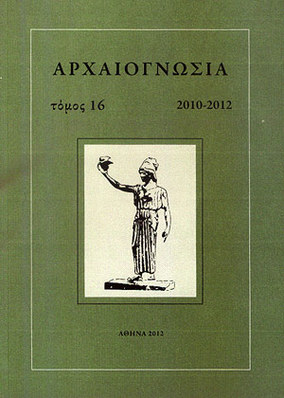Ομηρικοί νεκρικοί θρήνοι Ιλιάδος Ω 697-804 : μαρτυρίες και ερμηνείες
Part of : Αρχαιογνωσία ; Vol.14, No.1, 2006, pages 11-30
Issue:
Pages:
11-30
Parallel Title:
Funerary lament in Homer Iliad 24 697-804 : evidence and interpretation
Section Title:
Μελέτες = Articles
Author:
Abstract:
By the term “funerary lament” we mean the manifestation of honour towards a dead, based on vocal and verbal promulgation of the feelings caused by his/her loss to the living. The Iliad, due to the war it describes, offers us the most characteristic example of homeric funerary lament. This example is detected in the Trojan world, since the inhabitant Trojans (and not the besieging Greeks) are acting within the social, institutional and anthropological frame of their city, this frame being taken, in the epic, as typically Greek. The funerary lament for the death of Hector, the most eminent Trojan warrior, which is described in the last book of the Iliad is, therefore, the characteristic example of homeric funerary lament. From a total of numerous funerary honours (washing the dead, spreading perfumed oil on the body, prothesis, lament, ekphora, cremation, games, dinner) only lament is examined here. The ritual lament for Hector is offered by professional singers (εξαρχοι θρήνων), following the traditional epic pattern which assigns to the singer of the palace the functions that appear to be appropriate to the circumstances the palace is subject to. But in the Iliad 24 we are not presented with the content of the singers’ lament; what we learn is the content of the monological lamentations of Andromache, Hecuba and Helen in their capacity of εξαρχοι γόων. These three γόοι, which express the particular relationship of each one of those women with the dead, are structured according to a triadic scheme often adopted by the typology of the epic. This triadic scheme is here conveyed through a threefold sequence of which the three γόοι of the book 24 are the third and last part; two other instances of lamentation for Hector precede this third part, one in book 6, when Hector still lives, and another one in book 22, when Hector is just slained. The women participating in these γόοι are the same persons Hector encounters in book 6; eversince, in every new lamentation one more of these three women is added in climax. In the γόος of book 6 only Andromache takes part, in the γόος of the book 22 Andromache and Hecuba take part, in the γόος of book 24, Andromache, Hecuba and Helen take part. The question of Helen’s participation in the lament for Hector is also vindicated by the poet’s intention to integrate pre-iliadic narrations about the demolition of the institutional frame of marriage, country and war accomplished by Helen's actions, without injecting any positive or negative evaluation of his own in it, but only granting it an innovating function as an element of his epic’s narratological and stylistic typology.
Subject (LC):




